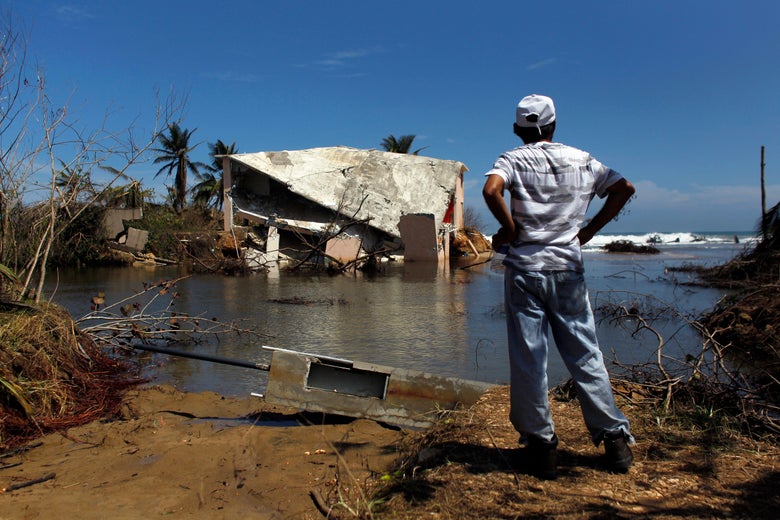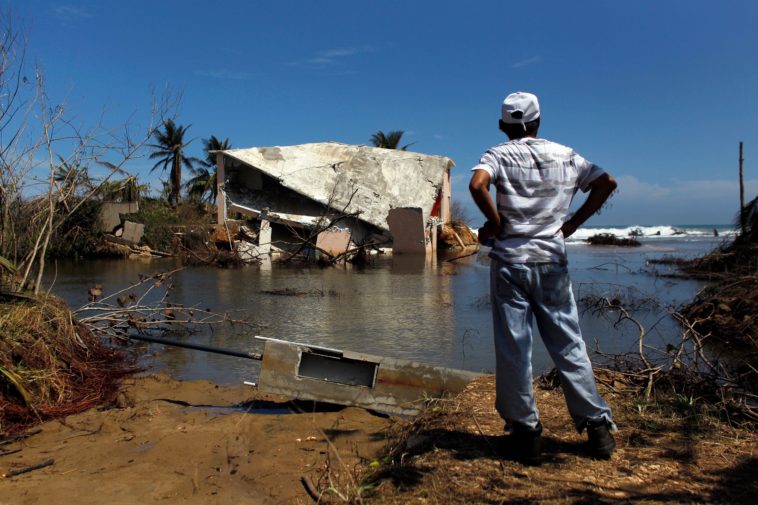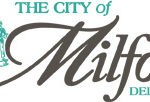How the Biden Administration Can Fix This Part of the Disaster Housing Crisis

AFP Contributor/Getty Images
This article is part of the Future Agenda, a series from Future Tense in which experts suggest specific, forward-looking actions the new Biden administration should implement.
In 2019, nearly 1 million Americans were displaced from their homes by hurricanes, floods, wildfires, tornadoes, and other natural disasters. As climate change renders these kinds of events more frequent and severe, the devastation is expanding from disaster havens like Florida, Texas, and Puerto Rico and battering Americans in places like Oregon, Missouri, and Arkansas.
These disasters destroy hundreds of thousands of homes each year, and the Federal Emergency Management Agency spends tens of millions of dollars helping families rebuild. But hundreds of thousands of disaster victims can’t get FEMA aid because they can’t prove they are the rightful occupants of the homes that have been destroyed. For example, after Hurricane Maria struck in 2017, more than a quarter-million Puerto Ricans were denied FEMA aid because the agency couldn’t verify their home occupancy.
As the number of billion-dollar weather disasters continues to grow, more Americans risk being unable to rebuild their homes because they can’t prove where they live. But the Biden administration can make a simple change to FEMA’s policies that just might solve this problem.
The problem is that FEMA often requires disaster victims to present home titles to access disaster aid, even though technically the law doesn’t require it. The Stafford Act, which governs disaster aid, allows the agency to provide money for home repairs to owner-occupied private homes damaged by natural disasters such as hurricanes, tornadoes, floods, and wildfires. The term owner-occupant is important—and fraught. The Stafford Act defines owner-occupant not just as someone with legal ownership, but also someone who “does not hold formal title to the residence and pays no rent, but is responsible for the payment of taxes or maintenance of the residence” or “has lifetime occupancy rights with formal title vested in another.”
These additional qualifications are critically important for millions of Americans who lack home titles because their homes were built, purchased, or passed down off the books. And sure enough, technically FEMA is supposed to accept a range of proof that someone is an owner-occupant—everything from a will to a property tax receipt. But in practice, that rarely happens.
Over the past 15 years, victims of hurricanes Katrina and Harvey, Hurricane Maria, and even the California wildfires have complained about being shut out of FEMA aid for not being able to produce home titles. Even where FEMA has been willing to accept evidence like wills or copies of bills, applicants have often been unable to produce the documents because they were destroyed along with their homes.
Climate change–induced disasters are displacing more Americans from their homes than ever before. I used data from the Internal Displacement Monitoring Centre to calculate that an average of 123,000 Americans were displaced each year between 2016 and 2019, compared with 52,000 between 2008 and 2011. The U.S. government has to become more efficient at making sure these disaster victims don’t become permanently homeless.
One obvious way to do this is to improve FEMA’s intake process and make sure the agency considers all legal forms of evidence when doling out aid. Sen. Elizabeth Warren, a Democrat from Massachusetts, and Reps. Adriano Espaillat, a Democrat from New York, and Jenniffer González-Colón, a Republican from Puerto Rico, have championed a second approach, which is to broaden the types of evidence FEMA accepts. The Senate’s Housing Survivors of Major Disasters Act of 2019 and its 2020 counterpart in the House would allow disaster survivors to produce everything from school registration and medical records to pay stubs and driver’s licenses to prove they are “owner-occupants.”
The bills even propose that, where necessary, FEMA develop and accept a “declarative statement” that hurricane victims can use to self-certify that they are the rightful occupants of their homes. This isn’t a completely novel idea. Facing overwhelming aid denial rates after Hurricane Maria, FEMA in 2018 had agreed to accept a “sworn statement” developed by the National Low Income Housing Coalition to help individuals without titles and deeds prove owner-occupancy. However, FEMA never publicized the sworn statement, and few Puerto Ricans ended up using it.
The idea of expanding the types of evidence disaster victims can use to prove occupancy is helpful, but we can take it a step further.
What if, instead of asking victims to produce paper documents that may have been destroyed in the disaster that rendered them homeless, we simply ask them to provide information they may already have in their phones?
Four out of five American adults own smartphones and use them for everything from staying in touch with friends to paying their bills. As our social and economic lives move online, we generate a wealth of data that reveals important things about us. When we use services like Google Maps, Facebook, M-Pesa, and Lyft, we generate a rich tapestry of evidence about where we go, what we purchase, whom we interact with. And, importantly, we generate data about where we live. Instead of relying on obscure documents that disaster victims may not have in the first place, we could empower them to prove where they live and qualify for FEMA aid using the data they have at their fingertips.
In most cases, a simple Google Maps location history between the hours of 10 p.m. and 5 a.m. shows conclusively where someone sleeps at night. A log of ride-sharing, Amazon orders, and food delivery likely pulls up the same location. Social media logs and e-commerce receipts are further proof points. And testimony from longtime neighbors, which can be delivered by text message or through an online platform, seals the deal.
In isolation, these pieces of evidence aren’t dispositive. An enterprising programmer can fake their location history, and it’s possible a disaster victim might always be ordering delivery to their significant other’s house or to their place of work. But together, these proof points become all but irrefutable. They create a tapestry of evidence that disaster victims can use to prove where they live, anytime and to anyone.
These innovations, of course, will not help Americans who do not own smartphones. However, that number gets smaller each year; according to Statista, the percentage of U.S. adults who own a smartphone jumped from 35 percent in 2011 to more than 80 percent in 2019. And some forms of digital evidence—like digital copies of documents and text messages from neighbors confirming a claimant lives where they say—can be stored on a feature phone.
Though the bills from Warren, Espaillat, and González-Colón haven’t been passed, we don’t need Congress to do this. The administrator of FEMA, who will be appointed by Biden in the coming months, has the power to expand the agency’s policies governing the ways disaster victims can prove where they live, including through digital proof. That seemingly simple change might help hundreds of thousands of Americans hang on to their home.
Future Tense
is a partnership of
Slate,
New America, and
Arizona State University
that examines emerging technologies, public policy, and society.
Published at Wed, 16 Dec 2020 14:30:00 +0000





Comments
Loading…